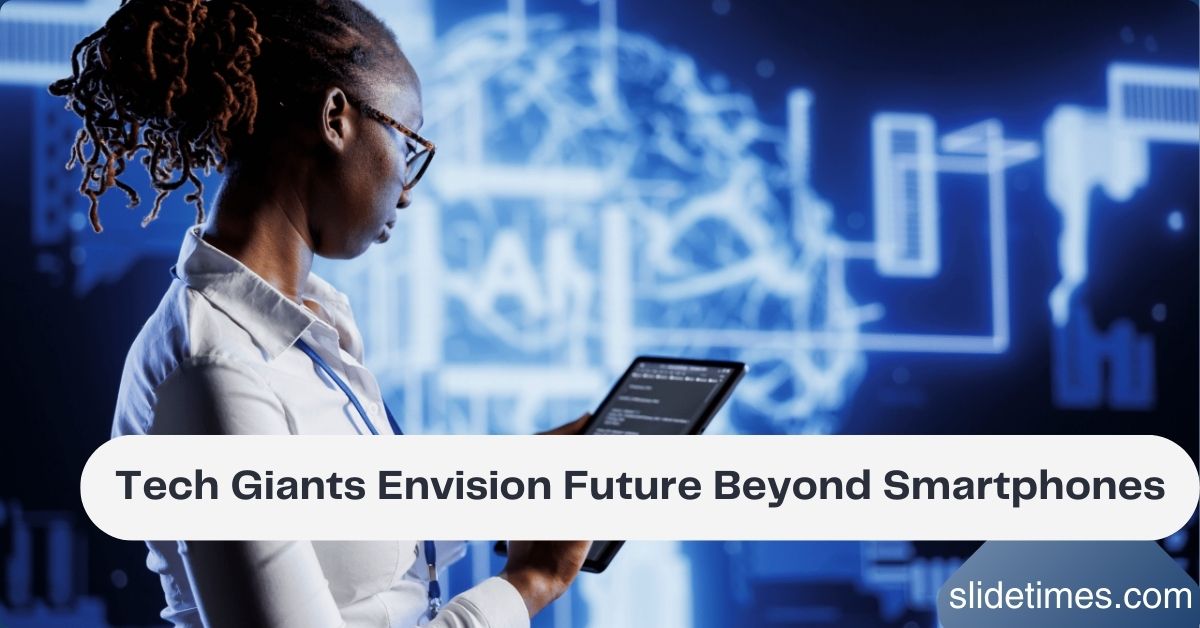In the ever-evolving tech landscape, smartphones have long been the cornerstone of our digital experience. But as the global tech giants shift their gaze towards the horizon, they’re envisioning a world beyond the screen of the smartphone. With significant investments in groundbreaking technologies like augmented reality (AR) glasses, artificial intelligence (AI), and ambient intelligence, the next decade could transform how we interact with the world around us. The ultimate goal? A world where smartphones become obsolete, and everyday objects seamlessly cater to our needs without explicit commands.
As tech giants envision future beyond smartphones, they are exploring technologies that promise to reshape entire industries. The convergence of AI, AR, machine learning, and advanced sensors will create an entirely new ecosystem—one that will be far more intuitive and embedded into our lives than smartphones ever could be.
In this article, we’ll explore the key innovations these tech giants are investing in, the impact of this shift on consumers, and how companies are working together to build the future of tech beyond smartphones.
The Shift in Focus: Tech Giants and the End of Smartphones
Smartphones have undoubtedly been a game-changer. Since the introduction of the iPhone in 2007, the smartphone has become an essential tool, not only for communication but also for entertainment, work, and even daily tasks. However, smartphones, as we know them, are reaching their limits. While these devices have continued to evolve with faster processors, better cameras, and more integrated features, a new wave of technological advancements is pushing the boundaries of what a traditional smartphone can offer.

Leading tech companies, including Apple, Google, Microsoft, Amazon, and Meta, have already begun shifting their focus towards the next frontier of technology: the integration of AI, AR, and ambient intelligence into daily life. This bold vision will ultimately make smartphones seem like a relic of the past.
Why Tech Giants Are Investing in the Future Beyond Smartphones
The driving force behind the significant investments in AR, AI, and other futuristic technologies is the realization that the current form of smartphones has reached a saturation point. According to reports, tech giants have collectively invested over $150 billion in these technologies, with projections that by 2032 to 2035, these investments will lead to the advent of ambient intelligence—a technology capable of making decisions, anticipating needs, and interacting with users without direct input.
Also Read: https://gadgetzona.net/2020/02/huawei-realme-sony-presentacion-24-febrero/
1. Augmented Reality (AR) Glasses: A New Paradigm for Interaction
One of the most exciting innovations on the horizon is AR glasses. Companies like Apple, Microsoft, and Meta are leading the charge with AR headsets and glasses that could one day replace smartphones. These devices will project digital information onto the real world, offering users an immersive experience that smartphones cannot replicate.
Imagine walking down the street with real-time navigation projected onto your glasses or receiving live translations of conversations in foreign languages. Unlike current VR technology that isolates you from the real world, AR allows you to interact with both the digital and physical worlds simultaneously. This creates new opportunities for education, entertainment, remote work, and beyond.
Apple’s rumored AR glasses, for example, are expected to allow users to interact with the world by simply using their eyes and gestures, thus eliminating the need to constantly engage with a physical screen. This shift could lead to a more seamless, hands-free experience where users no longer need to hold or touch a device.
2. Artificial Intelligence (AI) and Ambient Intelligence
Artificial intelligence, once a niche field, is now at the center of tech development. AI technologies are no longer limited to processing data; they are evolving into systems capable of predicting and responding to human behavior.
Ambient intelligence, a concept wherein AI systems anticipate and respond to needs without explicit commands, is set to revolutionize our interaction with technology. Imagine a world where your home, office, and even city infrastructure can sense your needs and adapt accordingly. Whether it’s adjusting the thermostat based on your activity or automatically organizing your schedule, AI-driven systems will become the invisible assistants we didn’t know we needed.
By 2035, tech companies aim to have developed fully integrated AI systems capable of acting as virtual personal assistants. These systems will anticipate needs based on historical data, preferences, and context, offering a more fluid, intelligent experience than current digital assistants like Siri, Alexa, or Google Assistant.
3. The Metaverse: A Fully Immersive, Virtual World
Meta (formerly Facebook) is investing heavily in the metaverse—a digital universe where users can engage in fully immersive virtual environments. The metaverse is expected to offer a blend of virtual reality, AR, and other immersive technologies, allowing people to work, socialize, shop, and entertain themselves in entirely new ways.
Also Read: https://onlypc.net/cuanto-dinero-gana-un-trader-profesional
Rather than checking your phone for a text message or browsing social media on a smartphone screen, you might enter a virtual world via AR glasses or a VR headset, seamlessly interacting with others in a 3D space. While the metaverse may take years to fully materialize, it represents a long-term vision where smartphones are no longer the primary interface for communication and entertainment.
How Ambient Intelligence Will Render Smartphones Obsolete
As tech giants envision future beyond smartphones, the integration of ambient intelligence and AI will make traditional devices obsolete. Here’s how:
- Seamless Integration: Instead of checking a smartphone for notifications or updates, AI systems integrated into daily objects will provide real-time alerts based on user behavior, needs, and context. Your kitchen fridge may suggest recipes based on the ingredients you have, or your car might alert you to traffic conditions and suggest the fastest route home.
- Predictive and Contextual Services: As AI algorithms grow smarter, they will predict needs without the need for direct input. In the future, smart devices may autonomously adjust your environment, from adjusting the lighting based on your mood to recommending content based on your preferences.
- Ambient Computing: Unlike smartphones, which require active engagement, ambient computing will operate in the background, constantly analyzing and anticipating what users need. These systems will offer assistance and services without requiring any direct interaction, allowing for a truly hands-off experience.
Impact on Consumer Behavior and Privacy Concerns
While the future of tech beyond smartphones holds great promise, it also brings forth several challenges. One of the most significant concerns is privacy. As AI systems collect vast amounts of data to anticipate and respond to user needs, there is potential for misuse or overreach in terms of personal data usage. The shift to ambient intelligence will require new regulations and safeguards to protect consumer privacy.
Consumers will also need to adapt to a world where technology is not only a tool but an active participant in their daily lives. This shift could lead to a more personalized, efficient experience, but it may also raise questions about autonomy and reliance on AI systems.
How Tech Giants Are Collaborating to Build the Future
The development of these technologies is not happening in isolation. Tech giants are increasingly collaborating to create standards and ecosystems that will ensure seamless integration of AI, AR, and ambient intelligence across devices and platforms. Companies like Apple, Google, and Microsoft are already working together to make sure their AI and AR systems can operate harmoniously across different devices and platforms.
Moreover, collaborations are extending beyond just tech companies. Manufacturers, automakers, and even healthcare providers are exploring how to integrate these new technologies into their products and services. The future beyond smartphones will be a world where every sector is connected by ambient intelligence, creating new opportunities and experiences for consumers.
Also Read: Money6x .com: Unlocking the Secrets of Earning, Saving, and Investing
FAQs about Tech Giants Envision Future Beyond Smartphones
What are AR glasses, and how will they replace smartphones?
AR glasses will overlay digital information onto the real world, offering a hands-free, immersive experience. They have the potential to replace smartphones by providing real-time navigation, virtual assistance, and entertainment directly through glasses, removing the need for traditional screens.
When will smartphones become obsolete?
While there is no exact timeline, tech companies predict that by 2032-2035, ambient intelligence will make smartphones largely obsolete. This will be driven by advancements in AI, AR, and seamless device integration.
What is ambient intelligence?
Ambient intelligence refers to AI systems that anticipate and respond to human needs without explicit commands. This will create a more seamless and personalized experience in various environments, from homes to workplaces.
How does the metaverse fit into the future beyond smartphones?
The metaverse will provide an immersive, virtual world where users can interact with digital environments, work, and socialize. It will likely replace many smartphone functions, offering more dynamic and interactive experiences.
What are the privacy concerns with ambient intelligence?
As AI systems collect vast amounts of personal data, there are concerns about how this data will be used and protected. Ensuring privacy and securing data will be major challenges as we move toward a world where ambient intelligence plays a central role.
Will the future beyond smartphones make life easier?
Yes, the goal of these technologies is to make life more efficient by anticipating needs, automating tasks, and creating more seamless interactions with the world around us.
Are there any potential drawbacks to these innovations?
While the future looks promising, concerns about privacy, security, and over-reliance on technology remain. Additionally, there will be challenges in making sure these technologies are accessible and equitable for everyone.
Conclusion
As tech giants envision future beyond smartphones, they are spearheading a technological revolution that promises to redefine how we interact with the world around us. With massive investments in augmented reality, artificial intelligence, and ambient intelligence, the vision of a seamless, hands-free digital experience is rapidly becoming a reality. By 2035, technologies like AR glasses, AI-driven systems, and fully integrated smart environments could make smartphones seem like relics of the past.
The transformation will not only change how we communicate, work, and entertain ourselves but will also introduce new challenges, particularly in privacy and security. While the shift to ambient intelligence offers immense potential for convenience and personalization, it will require careful navigation to ensure that consumer trust and data protection remain a top priority.
Ultimately, as these innovations continue to develop, we will witness a new era of technology where devices no longer require active engagement, but instead seamlessly integrate into our daily lives. The future beyond smartphones is not just a technological shift—it is a transformation of how we live, work, and experience the world.
